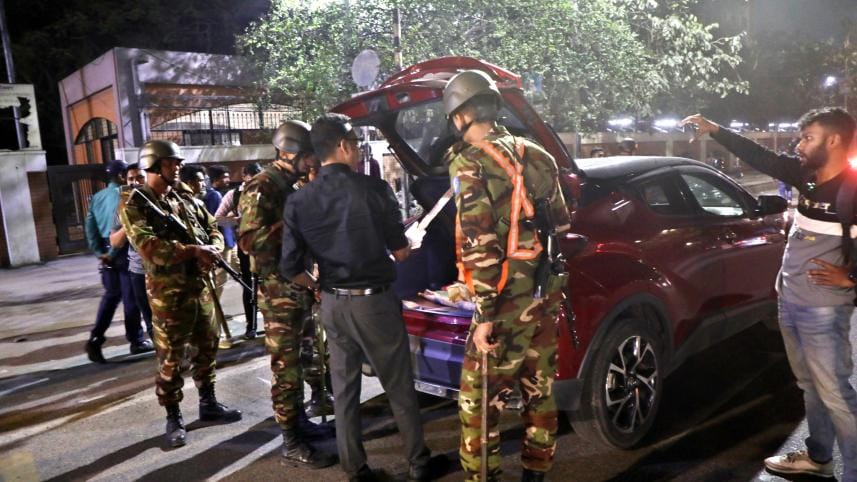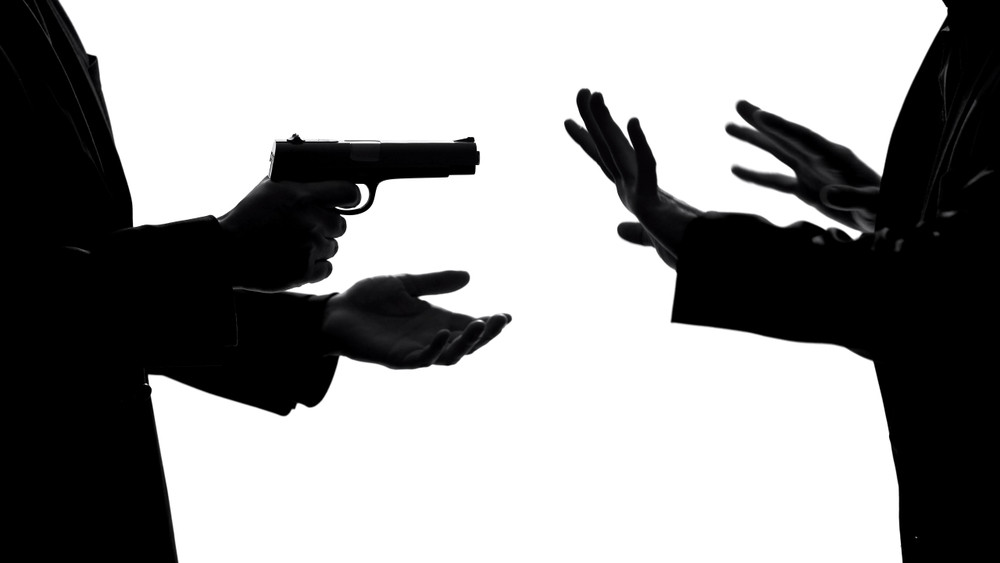Why the army’s prolonged role in law enforcement is not a good idea

On Monday, Chief of Army Staff Gen Waker-Uz-Zaman said the army must continue working to maintain law and order until Bangladesh gets an elected government. Although he also stated that "it is imperative that we perform our duties without engaging in any unruly behaviour," only a week before that, the Inter-Services Public Relations (ISPR) issued a statement on February 17 at a press conference on recent involvement of active and former military personnel in two high-profile robberies in Mohammadpur and Banani and on military's efforts to curb crime. As per the statement, when comparing data of December 2024 to February 2025, the military-assisted operations have significantly reduced extortion cases from 250 to 110, theft from 850 to 600, and murder from 350 to 120. Also, 334 drug dealers have been arrested, with large amounts of illicit drugs seized along with 172 illegal weapons and 527 bullets. Despite the apparent success, fact remains that some crimes remain high. Approximately 1,400 weapons and 250,000 rounds of ammunition stolen following the July uprising are still unaccounted for.
What was supposed to be a two-month emergency measure has quietly stretched into a military-supported status quo. Back in September 2024, the interim government handed magistracy powers to the army, justifying it as a necessary step to restore law and order. However, compared to December 2024, murder cases increased from 204 to 294 in January 2025 while theft increased slightly to 797 compared to 729 in December 2024. Moreover, the recent abduction of 25 rubber plantation workers in Bandarban indicates ongoing lawlessness in remote regions, where insurgent groups and organised crime networks continue to operate. Violence against women and children also remains high, with 1,043 cases reported in January 2025, a marginal decline from 1,205 in December 2024, suggesting that deep-rooted societal and institutional issues are not being effectively addressed.
As March 2025 unfolds and the month of fasting begins, the law-and-order situation seems to be sliding in spite of the army's supportive role. While the army's presence may have helped reduce unrest, soldiers are not trained to deal with criminal activities in civilian life like rape, dacoity, mugging, looting, arson, toll collection, etc. Unless the root causes—i.e. corruption, economic inequality, and festering political divisions—are addressed, mere presence of the army on the streets will not help resolve the ongoing law and order crisis. It resonates with the army chief's observation, "The disorders that have happened here are of our own making… We have created these ourselves. We have to keep in mind that if we continue the contrary actions, peace and order will never be restored."
Operation Devil Hunt: A temporary fix?
The government's Operation Devil Hunt, launched on February 8, 2025, is a recent major effort to tackle unrest and crime. It has led to 10,570 arrests till February 26, including 1,141 people already wanted for various crimes. Authorities have seized weapons and ammunition. While these arrests show the state's ability to crack down on disorder, they do not address the deeper causes of instability. It may bring temporary order and relief, but without real change, it is unlikely to create lasting peace.
History shows that prolonged military involvement in law enforcement risks power being misused, as it came out in the ISPR press briefing. If long-term stability is the goal, then focus should shift towards institutional reforms, which includes professional policing and building an effective judicial system. The army's presence may have the symbolic value of show of strength and generating confidence among the citizens, but it is not a panacea to deep-rooted socioeconomic chasm, intolerant political culture, and extreme swings on the political and ideological landscape of Bangladesh.
Ongoing civil unrest
In the recent past, the army's support was required to respond to law and order crises, including 30 road blockades in key industrial areas like Gazipur, Ashulia, and Savar. They also managed 42 chaotic situations, including 14 at educational institutions, nine tied to political conflicts, and 16 involving public disorder. However, despite army's presence, unrest remains widespread.
On February 5, as an angry mob demolished the residence of Sheikh Mujibur Rahman at Dhanmondi 32, the army personnel present in the scene remained passive. Hence, the chief adviser's statement that the incident was undesired did not have much buy-in from the critics as live telecast showed troops at the site largely remaining inactive. More recently, on February 16, drivers of CNG-run autorickshaws blocked the roads in Mirpur-1, Mirpur-14, and Rampura, among other places, protesting fines for overcharging passengers. They stopped moving autorickshaws with passengers, worsening traffic. A similar protest had already taken place on February 13 along Mirpur Road, causing public distress and intense traffic.
Tensions within educational institutions have intensified. On February 18, a violent confrontation erupted at the Khulna University of Engineering and Technology (KUET) between members of Students Against Discrimination and Jatiyatabadi Chhatra Dal, BNP's student wing, resulting in injuries to at least 50 students, some suffering from sharp weapon wounds. The dispute arose due to restrictions on student political activities that have been in place at KUET since August 2024.
The violence sparked protests at multiple universities. Students Against Discrimination held rallies at Dhaka University, while similar demonstrations erupted at Jahangirnagar University, Chittagong University, Rajshahi University, and Jagannath University. At KUET, students have demanded a total ban on student politics, among others. Until these demands are met, classes and exams remain suspended.
All of the above exemplifies that one cannot expect the army to effectively control all forms of civil unrest. These issues are traditionally handled by the civil administration and police force working in tandem. Hence, it is the government's responsibility to reform and empower the police to maintain law and order and ensure stability, especially before and during the elections. As aptly stated by the army chief, "Maintaining law and order is not the responsibility of the army alone. Apart from 200,000 police personnel, there are BGB, Rab, and Ansar-VDP members. Army has only 30,000 troops deployed. How can I fill this void with just 30,000 soldiers?"
Past lessons should not be forgotten
Currently, the army is not in the driving seat as it was during the military-backed caretaker government of 2006-2008, and this time its role is focused on maintaining law and order in a more restrained manner. However, the prolonged use of military power, in whatever form or manner, carries an inherent risk even when efforts are made to act in a cooperative and measured way.
During 2006-2008, the army's image was negatively affected by accusations of human rights violations and political suppression. Additionally, the economic downturn during that time was exacerbated by heavy-handed military control. Investors were hesitant and industries suffered from the absence of a proper civilian legal framework. Similar risks loom if the army remains engaged in supporting law enforcement beyond the necessary timeframe.
The military has shown reluctance to remain in power for extended periods, understanding that prolonged involvement in governance risks tarnishing its reputation. Unlike the Pakistan Army, the Bangladesh Army does not get engaged in the affairs of running the country, either openly or overtly. Hence, the interim government should not extend military magistracy beyond Eid-ul-Fitr, and should find ways to install confidence in the police, who are yet to recover from the trauma of the recent past. On that note, a clear transition plan should be put in place without delay so that regular law enforcers are in the driving seat, properly empowered by the government.
What lies ahead
The current state of law and order is epitomised by five syndromes: i) an army in a supportive role whereby they are not fully functional, and hence not fully effective either; ii) a shaken and traumatised police force with low morale, high insecurity, and resulting passivity and inefficiency; iii) an indecisive government lacking the courage to lead the nation out of the mess in the aftermath of the ouster of Sheikh Hasina government; iv) an evolving political landscape which is raising concern and eroding optimism that the nation had in the immediate aftermath of August 5, 2024; and v) a country on a slippery slope as uncertainty on elections and reforms dampen the positive spirit and democratic aspirations of the people. Continuance of any or all of the above cannot bode well for the nation, as echoed by the army chief, "I am warning you. If you cannot forget your differences and work together, if you engage in mudslinging and fighting, the independence and sovereignty of this country and nation will be at stake."
The problem is that those who are in a position to do something about it seem to be in slumber or in a state of denial or too scared to do the needful. The army's limited and supportive role in maintaining law and order will not help address any of these three situations prevailing in the mindset of those who were given the responsibility to steer the nation to a new dawn of hope and aspiration, positivity and prosperity. The interim government must find ways to effectively govern the country by being decisive and firm in dealing with the troublemakers, paving the way for the army to return to the barracks sooner than later. Otherwise, it may become increasingly difficult for the army chief to ensure, "While performing duties we must avoid the use of force, it may be applied only when absolutely necessary."
Prof Syed Munir Khasru is chairman of the Institute for Policy, Advocacy, and Governance (IPAG), an international think tank. His online profile can be found at www.syedmunirkhasru.org.
Views expressed in this article are the author's own.
Follow The Daily Star Opinion on Facebook for the latest opinions, commentaries and analyses by experts and professionals. To contribute your article or letter to The Daily Star Opinion, see our guidelines for submission.




 For all latest news, follow The Daily Star's Google News channel.
For all latest news, follow The Daily Star's Google News channel. 

Comments